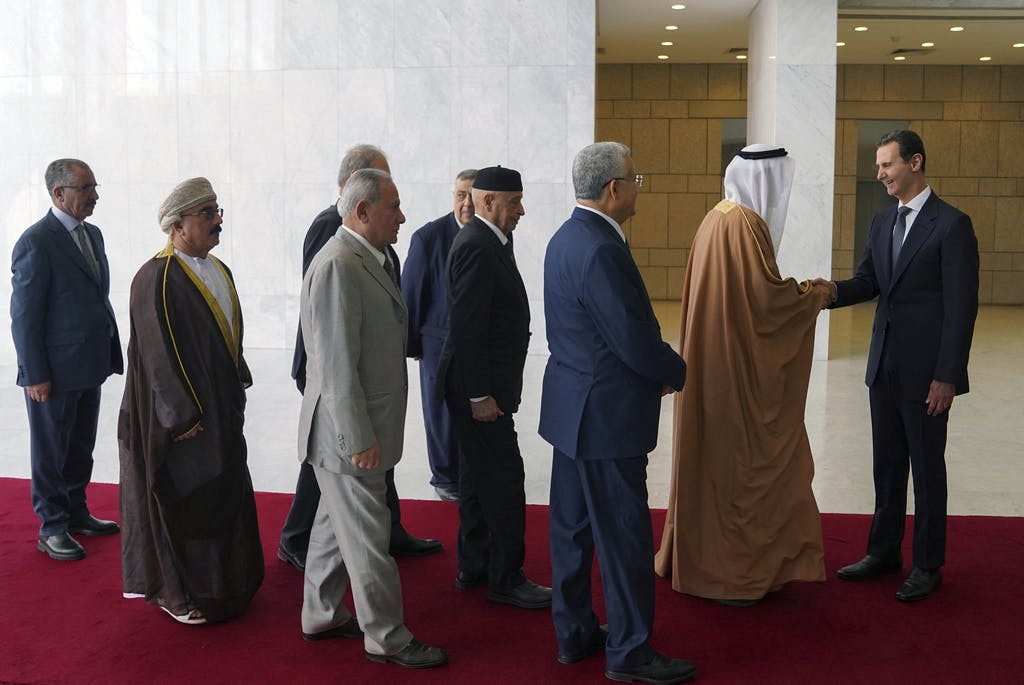Arab League About-Face Means Re-Embrace of Damascus Butcher
It is widely seen as a victory not only for the Syrian dictator, but for his allies at Moscow, Tehran, and Beijing. It is also perceived as a loss of American power and an erosion of its influence over Mideast affairs.

In a significant setback to President Biden’s declared human rights-based foreign policy, the Arab League is re-embracing a once-shunned member, Syria’s president, Bashar Assad, also known as the Damascus Butcher.
The 22-member Arab League expelled Mr. Assad in 2011 for his butchery at the height of the popular uprising that was known as the Arab Spring. On Sunday, Mr. Assad’s Syria was readmitted to the group with the support of some of the region’s most powerful players, including, notably, Saudi Arabia.
The Arab nod to Damascus was made without discernible concessions from Mr. Assad. It is widely seen as a victory not only for the Syrian dictator, but for his allies at Moscow, Tehran, and Beijing. It is also perceived as a loss of American power and an erosion of its influence over Mideast affairs.
Last week, President Raisi of Iran spent several days with Mr. Assad at Damascus, where the two leaders showered each other with compliments. In a joint statement, issued Friday, they also praised Beijing for brokering an agreement to renew Saudi-Iranian relations as a “significant step towards positive developments that are in the interest of the stability of the Middle East.”
In contrast to the Arab League’s group hug, the UN undersecretary for disarmament affairs, Izumi Nakamitsu, told the Security Council on Monday that chemical inspectors are yet to receive “accurate and complete” answers from the Assad regime. They include queries on gassing civilians, such as a notorious 2018 attack on the city of Douma.
Soon after Mr. Assad launched the civil war in 2011, President Obama drew a “red line” regarding the regime’s use of chemical arms — but failed to enforce his threat even after chemical attacks became painfully visible. Russia moved in quickly to prop up Mr. Assad and consolidate his hold on power. Iran sent in fighters and recruits from across the region and South Asia to help its Damascus ally.
During a 12-year civil war, Mr. Assad has presided over the deaths of up to 600,000 people. Millions of refugees were displaced in neighboring countries. “Assad must go” became a rallying cry in America, Europe, the halls of the United Nations, and across the Mideast. Washington’s traditional Sunni allies most enthusiastically embraced the call to end Syria’s Alawite regime. Now, all apparently is forgotten.
Riyadh’s turnaround is most astounding. In the first years of the Syrian civil war, the Saudis “have spent a fortune to get Assad overthrown, including by supporting shady characters in Syria,” a former UN Mideast mediator, Jamal Benomar, tells the Sun. “Now the Saudis are just coming around to acknowledge that Assad has prevailed, as if nothing happened.”
All of this is happening just as “the United States is basically absent,” Mr. Benomar, currently the president of the International Center for Dialog Initiatives, a think tank specializing in Mideast affairs, says. America, he adds, “has lost ground. It’s just watching events as they unfold.”
Washington is belatedly attempting now to re-establish presence in the Mideast and revive alliances that started with President Roosevelt’s 1945 pact with the House of Saud.
Last week, the national security adviser, Jake Sullivan, traveled to Riyadh, where Secretary Blinken is expected to visit soon. Following talks with the Saudis, two top Mideast advisers, Amos Hochstein and Brent McGruck, went on to discuss with Jerusalem officials a possible Saudi-Israeli peace treaty.
The Riyadh leadership is open to the idea of joining the Abraham Accords in return for several American measures, including an American-Saudi defense pact and help in establishing a civilian nuclear program. Washington has so far been slow in advancing negotiations, according to several sources. At the same time, Beijing is boasting several new inroads to the region, including that astounding Saudi-Iranian pact.
For the Biden administration, the agreement under the auspices of Chairman Xi was a “wake-up call,” the Foundation for Defense of Democracy’s Jonathan Schanzer, who returned on Friday from a Riyadh visit, tells the Sun. Reversing early policies, Washington in its Mideast policies is now “exploring pragmatism and wins, as opposed to wagging fingers.”
Following Mr. Obama’s unenforced red line, America angered Mideast allies by embracing foes like the Muslim Brotherhood, and with its pursuit of a nuclear deal with Iran — which it then dropped, and then attempted to revive. Additionally, Mr. Biden’s attempt to abruptly end reliance on fossil fuels made it seem like “America is disinterested in what the Mideast has to offer,” Mr. Schanzer says.
The Syrian regime’s rehabilitation is a boon for the world’s revisionists — Russia, Iran, and Communist China. Meanwhile the rehabilitation of Mr. Assad, “who by all accounts should be behind bars or dead, is a blow to the U.S.-led world order, for any semblance of moral and ethical policy,” Mr. Schanzer says.
America thus is now attempting to “consolidate our influence in traditional areas where we had influence in the past,” he adds. Following a string of unforced errors, Washington’s task now looks like a major uphill battle.

